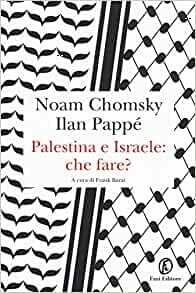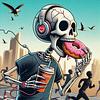Take a photo of a barcode or cover
informative
“How did you become an activist? Why Palestine?
Why? Because I think it is important to understand where the questions are coming from, and it is as important to look inside yourself, take a step back, relive your journey, pause, and realize that you too, not that long ago, may have asked the same questions of anyone engaged in working toward a better world—where equality, justice, and freedom apply to all, regardless of nationality, ethnicity, country of origin, skin color, political affiliation, or sexual orientation.
How, then, does one become an activist?
The easy answer would be to say that we do not become activists; we simply forget that we are. We are all born with compassion, generosity, and love for others inside us. We are all moved by injustice and discrimination. We are all, inside, concerned human beings. We all want to give more than to receive. We all want to live in a world where solidarity and companionship are more important values than individualism and selfishness. We all want to share beautiful things; experience joy, laughter, love; and experiment, together.
But we have a problem. A big one. We live in a society, and an epoch, where we do not have time to think any longer. We live in a time when taking a step back and a deep breath have become a luxury that many cannot afford.
We live in a world where the mainstream education system teaches you to obey and listen to authority from the earliest age and does not offer you the chance to think for yourself and express yourself in ways that are outside the proclaimed norm.
We live in a society where the “nothing” (shopping, watching TV) has become a “something” and the “something” (relaxing, meditating, sharing) has become a void in need of being filled. Our minds, our souls, have slowly been corrupted by materialistic nothingness that has been created for us, billboarded in front of our eyes, and printed, tattooed on our cells by advertising, marketing, and vulture capitalism.”
“Books changed me and I think that they are, more than anything else, one of the best tools we can use to learn, reflect on, and truly understand the world we are living in. They are a bridge between languages, continents, and people. A book will accompany you and will stay with you, it will mark you like nothing else. You will go back to it, quote it, argue about it. You will borrow one and lend one. The written word, in my opinion, is therefore more effective and long lasting than the spoken one as a tool for change.”
inspiring introduction to keep you hooked on the topic and all the information to come. overall a good first non-fiction book to get me started.
Why? Because I think it is important to understand where the questions are coming from, and it is as important to look inside yourself, take a step back, relive your journey, pause, and realize that you too, not that long ago, may have asked the same questions of anyone engaged in working toward a better world—where equality, justice, and freedom apply to all, regardless of nationality, ethnicity, country of origin, skin color, political affiliation, or sexual orientation.
How, then, does one become an activist?
The easy answer would be to say that we do not become activists; we simply forget that we are. We are all born with compassion, generosity, and love for others inside us. We are all moved by injustice and discrimination. We are all, inside, concerned human beings. We all want to give more than to receive. We all want to live in a world where solidarity and companionship are more important values than individualism and selfishness. We all want to share beautiful things; experience joy, laughter, love; and experiment, together.
But we have a problem. A big one. We live in a society, and an epoch, where we do not have time to think any longer. We live in a time when taking a step back and a deep breath have become a luxury that many cannot afford.
We live in a world where the mainstream education system teaches you to obey and listen to authority from the earliest age and does not offer you the chance to think for yourself and express yourself in ways that are outside the proclaimed norm.
We live in a society where the “nothing” (shopping, watching TV) has become a “something” and the “something” (relaxing, meditating, sharing) has become a void in need of being filled. Our minds, our souls, have slowly been corrupted by materialistic nothingness that has been created for us, billboarded in front of our eyes, and printed, tattooed on our cells by advertising, marketing, and vulture capitalism.”
“Books changed me and I think that they are, more than anything else, one of the best tools we can use to learn, reflect on, and truly understand the world we are living in. They are a bridge between languages, continents, and people. A book will accompany you and will stay with you, it will mark you like nothing else. You will go back to it, quote it, argue about it. You will borrow one and lend one. The written word, in my opinion, is therefore more effective and long lasting than the spoken one as a tool for change.”
inspiring introduction to keep you hooked on the topic and all the information to come. overall a good first non-fiction book to get me started.
I found this dialogue to be the most clear source of history + policy that I have read so far. Chomsky, historian from the states + a former zionist in conversation with Peppé, ~truly~ leftist israeli historian and former zionist. Charts the history of the BDS movement, arguments for and against potential solutions, definitions of ethnic cleansing, history of zionism, Palestinian resistance + intense mental grooming that accompanies theocratic ethnonationalism. Compares + contrasts several colonial projects to israel, primarily apartheid South Africa. This was written in 2015 but is applicable for this present moment + I was disturbed by how repetitive these tactics are (i.e. decrying antisemitism on campuses to silence legitimate critiques of imperialism [largely from Jewish organizers], etc). Argues this repetition will continue until the project of ethnic cleansing is complete. Unless! there is intervention from the states + other world powers.
informative
medium-paced
informative
reflective
medium-paced
challenging
dark
informative
slow-paced
informative
reflective
fast-paced
Highly, highly recommend.
Although this was written in 2015, there are so many parallels to what is happening to the Gaza Strip and West Bank today (2023/2024). I especially loved the discourse between Pappe and Chomsky and their similar yet differing viewpoints. Towards the end, it began to get a tad repetitive, repeating things that were mentioned earlier and briefly expanding on it. Overall, it was a great read and it allowed me to understand the Palestinian plight better, as well as understand how this "open-air prison" was only able to be created with the help of the Western powers backing Israel, or as I like to call it occupied Palestine.
Although this was written in 2015, there are so many parallels to what is happening to the Gaza Strip and West Bank today (2023/2024). I especially loved the discourse between Pappe and Chomsky and their similar yet differing viewpoints. Towards the end, it began to get a tad repetitive, repeating things that were mentioned earlier and briefly expanding on it. Overall, it was a great read and it allowed me to understand the Palestinian plight better, as well as understand how this "open-air prison" was only able to be created with the help of the Western powers backing Israel, or as I like to call it occupied Palestine.
medium-paced
informative
reflective
medium-paced
This book was great at explaining the careful planning of Zionism. Chomsky and Pappe really hammer the point the genocide in Palestine isn’t a “complex issue” that people claim it is. It’s very simple; Israelis are settler colonialists who are oppressing the indigenous population with violence. As long as the US continues to send aid, the genocide will continue. We need to educate people and advocate for the US to pull support for Palestine if we want to see any changes.
I gave this 4 stars because I wish there was more explanation for the Uganda Scheme and Green Line. There was a lot of repetition of points they were already made. Overall still a great read.
I gave this 4 stars because I wish there was more explanation for the Uganda Scheme and Green Line. There was a lot of repetition of points they were already made. Overall still a great read.
challenging
reflective
fast-paced
Very informative and informative. It was very interesting to see the perspective of an Israeli historian. My only issue was that I found it to be quite poorly edited in places.






